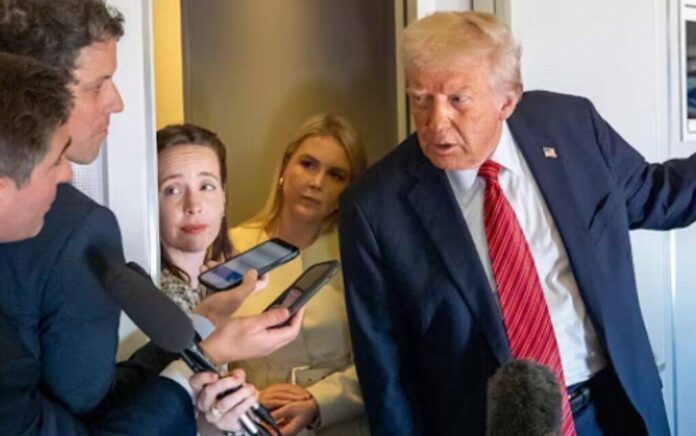
President Donald Trump has reignited a fierce debate over birthright citizenship as the Supreme Court took up the issue on Thursday.
His remarks, delivered via Truth Social, underscore a historical perspective, a critique of modern misuse, and the ongoing legal battle shaping the nation’s immigration policy. Below, we delve into the controversy through three lenses: the amendment’s original purpose, its contemporary exploitation, and the judicial stakes at play.
Historical Roots of the 14th Amendment
Trump insists that birthright citizenship, enshrined in the 14th Amendment of 1868, was crafted with a narrow intent: to secure citizenship for the descendants of enslaved people.
In his post, he declared, “It had nothing to do with Illegal Immigration for people wanting to SCAM our Country, from all parts of the World, which they have done for many years.” He emphasized that the amendment was a response to the Civil War, aimed at protecting “the babies of slaves who our politicians felt, correctly, needed protection.”
Trump urged the Supreme Court to anchor its ruling in this historical context, arguing that the amendment’s scope has been distorted over time.
Modern Misuse and National Dysfunction
The former president painted a vivid picture of birthright citizenship’s current exploitation, claiming it incentivizes opportunistic immigration.
“Birthright Citizenship was not meant for people taking vacations to become permanent Citizens of the United States of America, and bringing their families with them, all the time laughing at the ‘SUCKERS’ that we are!” he wrote.
Trump asserted that the U.S. stands alone globally in offering automatic citizenship to anyone born on its soil, a policy he says benefits “drug cartels” and others. He labeled this practice a hallmark of national “dysfunction,” driven by a misguided adherence to political correctness.
“We are, for the sake of being politically correct, a STUPID Country,” he added, framing the issue as a self-inflicted wound on America’s sovereignty.
Judicial Battle and Broader Implications
The Supreme Court case originates from Trump’s Day One executive order, signed to reinterpret the 14th Amendment and limit birthright citizenship, with an intended start date of Feb. 19.
Almost immediately, legal challenges erupted, and Democratic-appointed federal judges issued universal injunctions to block the order, halting its implementation. The Trump administration’s appeals faltered, prompting the Supreme Court to step in.
The justices’ decision will not only clarify the amendment’s modern application but also address a critical procedural question: can lower courts permanently block executive actions through universal injunctions? The ruling’s timing remains uncertain—while an emergency decision could emerge within hours, a comprehensive verdict might take weeks.
This case highlights a broader tension between executive authority and judicial oversight, with implications for how future administrations navigate policy changes.
Trump’s rhetoric underscores his view that birthright citizenship, as currently applied, undermines national interests.
As the nation awaits the Court’s decision, the debate continues to polarize, reflecting deep divisions over immigration, constitutional interpretation, and the balance of power.



















